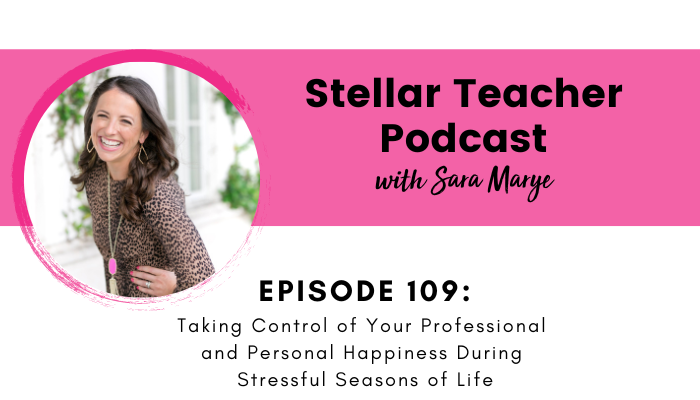
Click play below to hear how to take control of your professional and personal happiness:
In the spirit of Thanksgiving and being grateful and thankful, I first, am so grateful for each of my listeners on this podcast. Y’all are amazing and the reason why I get to do what I’m doing. And secondly, this time of year provides a great opportunity to reflect and evaluate your professional and personal happiness.
So we’re going to take a short break from our regular literacy discussions, and focus on how to take control of your professional and personal happiness during stressful seasons of life.
While I always think it’s a great time to check in with yourself and focus on your personal happiness, it’s been an even bigger topic over the last two years.
With the stress of all that’s been going on, it has put a strain on teachers, which can sometimes make it difficult to be happy and find joy. Therefore, I’ve implemented 3 happiness hacks that impact my overall mood, mindset, and require action in order to increase personal happiness.
In order to be the positive and effective teacher you want to be, it’s important to focus on finding your professional and personal happiness first. This time of year lends itself nicely when making personal happiness a priority in your life. You know I love supporting you in the classroom, but I also want to find ways to support and encourage you as a whole person, which is what I hope you take away from this episode!
In this episode on taking control of your professional and personal happiness, I share:
- My own personal journey and struggle to find personal happiness during a difficult season
- 3 things that are important to understand about the idea of truly being happy
- The powerful difference between the words should vs. could
- Why doing what makes you happy every day boosts your overall mood
- A check-in on comparison and ways to focus more on yourself than others
Resources:
- Check out the Stellar Teacher Reading Membership
- If you’re enjoying this podcast, please leave a review on Apple Podcasts!
Related episodes and blog posts:
- Episode 83, 5 Mindset Shifts Teachers Should Make Regarding Self Care with Alexis Shepard from the Afro Educator
- Episode 60, Practical Self Care for Teachers with Sarah Frost, The Designer Teacher
Connect with me:
- Join my newsletter
- Shop my TPT store here
- Instagram: @thestellarteachercompany
More About Stellar Teacher Podcast:
Welcome to the Stellar Teacher Podcast! We believe teaching literacy is a skill. It takes a lot of time, practice, and effort to be good at it. This podcast will show you how to level up your literacy instruction and make a massive impact with your students, all while having a little fun!
Your host, Sara Marye, is a literacy specialist passionate about helping elementary teachers around the world pass on their love of reading to their students. She has over a decade of experience working as a classroom teacher and school administrator. Sara has made it her mission to create high quality no-fluff resources and lesson ideas that are both meaningful and engaging for young readers.
Each week, Sara and her guests will share their knowledge, tips, and tricks so that you can feel confident in your ability to transform your students into life-long readers.
Tune in on your favorite podcast platform: Apple, Google, Amazon, Spotify, Stitcher, and more! If you’re loving this podcast, please rate, review, and follow!
Podcast (stellar-teacher-podcast): Play in new window | Download
Hey, friends, happy Monday. It is the Monday before Thanksgiving. And in honor of this holiday, I thought that we would stray maybe a little bit from our normal literacy topics and talk about something that is equally as important as literacy. And that is personal happiness.
Now, I know that some of you are still teaching today. And honestly, I don’t know why schools actually have school today, tomorrow, Wednesday. I remember when I was in the classroom, several districts I worked at, we always had school before Thanksgiving, and I thought it was the most unproductive use of our time.
So really, I hope that most of you are at home, enjoying a full week off. And I hope that you’re maybe even taking a break from podcasts. And maybe you’re listening to this after it airs. But I know I have some very faithful listeners who tune in every single week and do not worry, next week, we will resume our regular teacher content where we talk about, you know, literacy and lesson planning ideas and all of those things.
But I wanted to do this episode talking specifically about ways that we can increase our happiness or ways that we can find you know, more happiness in life. And when I put together my podcast episodes, or when I think about, you know, topics or content that I want to share with you guys, you know, first and foremost, obviously, I want you to be a successful and confident and happy teacher, but not only do I want those things for you, in your professional life, I want those things for you in your personal life. I truly do care about each and every person that tunes in to this podcast, and I want you to love and enjoy teaching, I want you to get you know, professional satisfaction.
And I have found in my own life that it is it’s hard to enjoy work, it’s hard to enjoy just life in general, when there is maybe a lot of extra stress or anxiety. And I know that the last two years, you know, really, since the pandemic have been difficult for everyone, and especially, you know, especially for teachers. And if I had to take a guess I feel pretty confident in assuming that the last two years, you have probably experienced more stress than normal, possibly more anxiety than normal, maybe you’ve even experienced some seasons of situational depression. And I know that when you know when we live in a state where we are constantly stressed or anxious or experiencing some of those depressive feelings, it’s hard to be happy. And it’s hard to enjoy life.
And like I said, I want you guys listening to not only enjoy teaching, but I want you to enjoy life in general. And not that I am. I am not a I’m not a happiness guru. I’m not a happiness expert. I am not personally happy every single day of my life.
But it is something that I have had to focus on over the last couple of years because probably similar to you guys, you know, it’s sort of just some personal background, I have historically been a happy person, I feel very fortunate that I just have generally a positive outlook on life, I’m generally pretty optimistic, and I usually can find the good in every situation. But since the pandemic, like everybody, you know, the last two years has been just really, really hard. Right when the pandemic happened, if you’ve been following me for a while, you probably remember hear me talk about it. But my husband and I moved across the country, we moved from Houston, Texas to Florida.
And moving in the middle of the pandemic was incredibly hard because we had a really great community in Houston, we had wonderful neighbors, we were close to family, we had a really good church that we were plugged into, and we moved, you know, during a time where people did not want to connect, where everybody’s kind of disconnected.
And it just took us a very long time to get plugged in here and to make connections. And then you know, on top of that there’s just a lot of uncertainty with life in general. I run a small business, there’s been a lot of uncertainty with managing the small business over the last couple of years. And you know, I started to notice, probably, you know, towards the end of 2020 after we’d been in Florida for about, you know, six or eight months I started to notice that I just was not feeling my normal self, I was not happy as I used to be, you know, and I didn’t want to do things that usually brought me joy, whether it’s, you know, connecting with people or reading or exercising. And it’s just, I feel like sort of my, my mood was quite a bit lower, like my baseline mood was quite a bit lower than it usually was.
And that kind of made me sad, but it also kind of bothered me, because I’m just like, you know what, like, life is too short. And even though, you know, there’s this global pandemic happening, I don’t want to wait for happiness to happen to me, like, I just don’t want to wait for my life circumstances to change in order to improve just my overall feelings and moods. So I took some actions, I engaged in some life coaching.
So I had a life coach for a year, which was really, really helpful for a lot of things. I also went to therapy and saw therapist for a while to just talk about sort of like, you know, how difficult it was to move and grieving the loss of what I had in Houston and sort of just readjusting my expectations, that was incredibly helpful.
And I also spent a lot of time just like reading about, you know, mindset and reading, I mean, a lot of things reading about mindset reading about, you know, social media, reading about burnout, just reading about a lot of things that reading about, you know, brain chatter, just reading a lot of books that would hopefully help give me some tools that I could use in my own life to increase my mood and elevate my happiness levels.
And what I realized is that if I wanted to be happy and truly enjoy my life, that I needed to take responsibility for making that happen, you know, like I said, I couldn’t wait, I couldn’t just really sit back and wait for happiness to happen to me. So I have just three things that I’m going to share with you today. And they’re maybe you could even call them like, happiness hacks, that hopefully, you know, you hear them and they’re small and easy things that you can do that will hopefully just help elevate your mood a little bit.
But before I get into those hacks, I want to first of all, restate the disclaimer that I am not like an expert in psychology or a therapist, and I am not, you know, a happiness expert, and I’m not happy all the time. You know, I definitely still hav my days where something stressful happens, or, you know, something unexpected happens, or I’m just sort of like in a wool. But I will say, you know, over the last couple of years that I have actively worked on pursuing things that do bring more joy to my life. And I’ve definitely learned a lot of strategies and mindset shifts that have helped me.
And I think especially part of the reason why I wanted to do this special episode before Thanksgiving is that I know that as we approach the holiday season, you know, Thanksgiving and Christmas, I feel like it’s a stressful time of year. Even in teaching, if you think about it, there’s a lot of disruptive weeks, students are anxious for winter break, teachers are anxious for winter break. And I feel like it is just the time of year where we maybe need some reminders, or just some extra ideas on what are things that we can do that will help us find joy and happiness on a daily basis.
So I’m going to share three things with you, that will hopefully help you increase your happiness, both during this holiday season and in the new year. But I think before I share those things, again, the last thing I’m going to say about this, I think it’s important to understand really three things about this idea of being happy. And I think first, it’s important to remind yourself that, you know, we can’t be happy all of the time, or this idea that we should be happy all of the time. You know, I feel like that’s an unrealistic expectations.
And I think sometimes just for whatever reason, we have this idea that it’s like, oh, I always need to be in a good mood, especially if you’re genuinely, you know, a happy person, it can sort of have this expectation that oh, I need to be happy all the time. My Life Coach sort of once shared with me, she’s like, if you think about your days, 50% of them are going to be above average, and 50% of them are going to be below average.
And I was like that’s mathematically accurate. At least I think that’s mathematically accurate. But the same is true. It’s like if you think about it, not every day is going to be your happiest today that’s like an unsustainable tracks to be on. So I think first of all, reminding yourself that it is okay, if you have a down day, it’s okay, not to be happy all of the time, just because you’re maybe in a season or a few stretches of days or weeks or months or even years that you’re feeling maybe less than your normal happiness level. That doesn’t mean that you won’t get back to your normal level or you can’t change your levels of happiness. But I think don’t expect yourself to be happy all the time.
And the second thing is we can’t make our happiness, someone else’s responsibility. And I think so often, you know, we expect whether it is our significant other or family members or even co workers, you know, we sort of put this pressure on other people. It’s like, oh, well, it’s their job to make me happy. And we might not ever say that, but it’s just like, Okay, wait a minute, like I can’t rely on somebody else, to change my mood or to change the way I feel about something like I have to make my feelings my own responsibility.
And then the third thing that I think it’s important to keep in mind is that sometimes we have to be willing to change our actions in order to get a change in our feelings. And do you ever have those days where it’s just like I’m in a bad mood today and I want to be in a bad mood, like there’s nothing that I want to do to change it, I’m just going to be grumpy and crabby. But it’s like, if you are in a bad mood, or you’re having a bad mood day or week, we have to realize it’s like, okay, wait a minute, if I don’t like feeling this way, and I do want to feel a certain level of happiness, I have to be willing to change my actions. And I have to be open to this idea that my current feelings of frustration or unhappiness don’t have to last forever. So just a couple things to keep in mind.
But now let me share three easy things that you can do that will hopefully increase your happiness levels this holiday season. And the first thing that I want you to think about doing is reframe your to do list. And instead of saying things like I should do fill in the blank, you’re going to simply just say it as I could do. So rather than saying you should do something, and I know especially during this time of year, I feel like our to do lists fill up with so many shoulds I should clean my house, I should decorate I should bake something, I should get gifts, you know, whatever it is, simply say I could do those things.
And you know, for example, maybe it’s a Saturday morning, or maybe even you’re trying to wake up early and exercise rather than saying, I should go for a run, just tell yourself, I could go for a run. And making this simple word shift has really a huge impact. Because when we use the word should, it implies an obligation, it comes across as an order.
And even if you’re the one that’s telling yourself, you should do something, the problem is, if you say well, I should do this, I should do the dishes, I should clean, I should call my mom, I shouldn’t watch TV, or I should go to bed early, whatever it is, if you’re telling yourself you should do something, and then you don’t do it, or you make a different decision, you’re going to feel like you failed. And I don’t know about you. But for me, it’s hard to feel happy and to feel joyful. When I feel like I’m constantly failing at something or I feel like I am failing because I didn’t do something that I told myself, I should do.
But when you use the word could, it comes with so much more possibility and flexibility. You know, when you say you could do something, you’re really simply offering up a suggestion. But it’s not a requirement. And really, you’re basically giving yourself permission to explore other options or possibly change your mind. And so using the word could is going to eliminate that pressure and the expectation to do all of the things that you feel like you should be doing.
You know, and this is something that I have been working on in my own life trying to reframe, you know, rather than telling myself, Oh, I should do that. It’s like, No, I could do that. And I think the reason why that this really can have an impact on just your overall happiness and your overall mood is first of all, we tend to be really unrealistic with what we can get done in a day. You know, when we’re thinking about our schedule, whether it is professional or personal, we tend to think that we can get things done faster than we really can. So if all of the things on your list are should I should do laundry, I should clean my house, I should make Christmas cookies, I should grade papers, I should call my mom, I should clean my classroom, I should, I should, I should. You know if you put all of those things on your list. And you know, usually when you’re making your to do list, you’re not writing them out as shoulds. But in your head, you’re making a list a mental note of oh, these are all the things that I should do. First of all, everything that’s on your list, it’s not physically possible to get everything done.
But if your to do list is filled with shoulds, and you don’t get something finished, like I said, it’s going to sort of elicit that feeling of like, oh my gosh, I failed because I was supposed to get this thing done, I was an obligation and they didn’t do it. But if you just simply start to tell yourself, the things that are on your to do list are things that you could get done. If you don’t do them, then it’s okay. And you’re giving yourself freedom and flexibility to first of all, choose the things that are going to be the most important, but also things that are most enjoyable to you. So just as you think about approaching this holiday season, you know, rather than saying all of the shoulds, just try to put them as coulds, things that you could do and realizing that they’re things that you could do, but they’re also things that you don’t have to do.
And a bonus tip with this, you know, reframing the shoulds versus the coulds, start noticing how often you tell other people, they should do something. And my husband and I have been really paying attention to just the you know, and a lot of times it’s just my husband and I we don’t have any kids. And so when when we have conversations, a lot of times we’re talking through work things or you know, giving an advice or how to navigate conversations or decisions.
And a lot of times we will tell the other person oh, you should do this, you know, or if you know my husband recently started working out quite a bit and he he’ll ask something and you know, an idea for a workout or, you know, something related to running and I want to be like, oh, you should you know, it’s like oh, if you want to build muscle, you should do this or it’s oh, you know, you should run this many miles but it’s like no, it’s not that you should it’s like oh, you could this is an option.
So just start paying attention to if you know people ask you for advice or if you’re giving even directions to, you know, your kids, your significant other, or even your students just notice how often you say should. And is it appropriate for you to say could instead, you know, we’re not telling people, these are things you have to do, we’re just simply offering up suggestions. But it can give the same impact to others.
You know, if somebody asks for advice, a lot of times, we want to say, oh, you should do that. But if we tell them, they should, and they don’t do it, you know, it’s gonna the way their brain interprets it, it’s gonna be like, Oh, well, I failed at that. So just try to even when you’re giving advice, or talking to other people try to use could instead of should. So that’s my first suggestion on ways that you can hopefully be a little bit happier this year is giving yourself permission to not have should on your to do list.
Okay, the second one is actually to create a list. And what I want you to consider doing is to create what I like to call a happiness list. And this can be a fun thing to do on a Saturday or Sunday morning, you know, or if you have an evening, where you have a few extra minutes, it doesn’t take long, maybe 10 minutes. And if you’re like I don’t have enough time, then that’s probably a good sign that you probably need to put a date on the calendar to spend some time with yourself and thinking about these things, you know, maybe make yourself a cup of tea, turn on some music, light a candle, you know, just something that first of all, is going to put you in a good mood, something that you’re just going to, you know, you’re going to create the environment that’s hopefully going to lead to these feelings of happiness.
But what I want you to do is just really think about what are the things, the experiences or the people that bring you joy and happiness when you encounter them. And it literally can be anything. But just think about like, truly, what are the things that make you the most happy and write them down, make a list, whether it’s a post it note or on your phone, but try to make a list of you know, five to 10 things that really bring happiness into your life on an everyday basis and try to think about things that you could do really every single day.
So I’ve done this, and this is my list, and there’s nothing really like like they’re pretty ordinary type things. But these things truly make me happy and bring me joy drinking coffee. First of all, I don’t think people understand like how much joy coffee brings in my life that drinking coffee every morning, like usually when I’m going to bed at night, I like to get excited about the idea of waking up and drinking coffee. So for me like drinking coffee is one of those things that it always makes me happy. But the rest of my list is reading a book, walking my dogs, spending time with my husband, calling my best friend, my mom or my siblings, cooking a new recipe.
I love I don’t necessarily love cooking dinner every single night. But I love cooking a new recipe, especially if I have you know extra time or on the weekends if I want to bake something I’ve really I enjoy cooking. I also really love watching the Great British Baking Show. Even the reruns and I have seen pretty much every single episode, you know, multiple times for whatever reason that show just brings me so much joy and happiness. I also love this is probably a no surprise to any of you that follow me on Instagram, I love going to the beach. I mean, every time we walk out and cross over the bridge to you know, the walkway to get to the sand in the ocean, I just get a smile on my face and just being outside at the beach brings me so much happiness.
And the same is true for hiking. And hiking isn’t necessarily something that I’m able to do every day just based off of where we live. But when I do go hiking, it is something that brings me so much joy and happiness. But even so like anytime I go out for a walk with my neighbor or my girlfriends, that is something that I just really enjoy.
And so nothing on this list is necessarily like really revolutionary. But these are things that personally for me, bring me joy and happiness. And I know that when I sit down and I read for 20 minutes or when I pour myself a cup of coffee or when I take my dogs for a walk, I know that I am going to feel refreshed, I know that I am going to enjoy these activities. If it has something to do with people or talking to people, I am going to feel connected. And just in general, when I do these things on a very regular basis, I feel happier as a person.
So I’ve made this list and I really use it in two ways. First, I make sure that I tried to do at least one but really multiple of these things every single day. And like I said, because I have such a strong love of coffee, it makes it easy to do multiple things on my list every day. But I am really intentional about trying to schedule in these things in my morning. I mean obviously every morning I give myself you know 15 minutes to drink a cup of coffee before I you know jump into work. I schedule time to walk my dogs into my day.
I actually have an alarm on my phone that is set for 4:30pm which is when I try to end work for the day that says call someone and it could be my mom, it could be my friend it could be my siblings but just I know that when I talk on the phone to somebody especially if it’s you know somebody you know an old neighbor or family member that I don’t get to see that often having that connection truly does, it lifts my mood it makes me feel connected.
You know, if you have worked from home or ever had to move and leave a community behind like you just you probably know how important that human connection is. And so, you know I work from home which me I don’t have coworkers to interact with. So anytime I can get human interaction during the day, it really elevates my mood.
And so I have an alarm at my phone. And sometimes I am not finished with work at 430. And I want to keep on working. And I want to keep just knocking things off my To Do lists. But I have to remind myself, it’s like, no, I put this on my calendar for a reason. I know that even if I spend just 15 minutes talking to someone, it is going to help me feel happier as a person. And that is going to be more important to work. And so I have to even if I come back to work, I have to make that phone call at 430 because connecting with people during the day is something that brings me joy.
So that is one way that I use this list is to schedule these things into my day. And I think too just being intentional about okay, I know the things that make me happy. And I’m going to be intentional about putting them into my schedule, there is something I think just really empowering about that.
And then the second thing is when I’m feeling down, or blue, or sad or frustrated, or if I’ve had a rough day, I refer back to this list. And even if I don’t want to, I really try to force myself to do something on my happy list, because I know that it’s going to be a mood booster. And so a lot of times this is where it’s like, Oh, if I’ve had a rough day, and I don’t feel like you know, doing anything, it’s like you know what, I can turn on the Great British Baking Show and I can watch 30 minutes an hour, an hour and a half of TV. And even though they’re reruns, I get joy out of watching that show. And so even even though that’s not maybe something that is considered to be really productive, it does make me happy. And it gives me a chance to sort of shift the direction of my day.
Or if it’s like, great, let me call up. I’ve got a neighbor that lives right across the street. And it can be so convenient, because it’s like, hey, maybe she wants to go for a walk with me right now. And so it’s just like, Okay, I’ve had a rough day, I know that if I go for a walk with my neighbor, or watch this TV show or read a book, like it might not fix all of my problems, but in the moment, it might elevate my mood and just helped me feel better overall.
And I think it’s really important to realize that yes, this happiness list of 10, things like these 10 things aren’t going to fix all of life’s problems, and they are not going to eliminate all of the stress. But they are going to provide me with pockets of enjoyment throughout the day. And I think if we want to enjoy our life overall, we really need to be intentional about cultivating and creating these moments where we can find joy.
And I think today earlier, when I was on Instagram, I saw a quote and somebody said instead of trying to solve all of your problems, you know, let’s try to just add more goodness into our life. And life is stressful. Being an adult is hard, figuring out even before the pandemic, it was hard. And since the pandemic I feel like it’s just life has been, you know, extra hard.
But we have problems, we’re always gonna have problems and we can try to solve those things. But simultaneously, we need to really just think about how can I bring more goodness into my life. And so if you have a list, and you know, those things make you happy, do them on a daily basis. So make a happiness list and try to incorporate those things into your life daily if possible.
Now, this last one is going to be a lot harder and a lot less practical. But I also think it is really important if you are wanting to be intentional about just increasing your happiness level. And this one is, especially during the holiday season, I think stop comparing yourself to anyone and everyone. You know, and you guys are probably all familiar with the quote, Comparison is the thief of all joy. And I think that is so true.
But I also saw a quote once that said, comparison will either make you feel superior or inferior, and neither honors yourself or others. And I love that and I was like that is so true. It’s like when we compare ourselves to somebody else, if we see somebody else and we’re like I am less than, I’m not as good as you know, that is not honoring to you, yourself. But the flipside can be true, you know, if you are comparing yourself and you see, you know, oh, I have something better than somebody else or I’m I’m more successful, or whatever it is, that’s also not honoring to yourself or others.
And so comparison in general is just it’s an ugly trap that we can fall into. And I think especially during the holidays, whether it is the type of or the amount of decorations you have, you know what your house looks like, the gifts that you give or receive, family gatherings, you know, even just like Christmas parties or how jam packed your social calendar is, comparison just becomes way more elevated during the holidays, and comparison both in your personal life and professional life is not productive or helpful. And it will not lead to happiness. And I think we really need to be intentional about trying to stop it.
And this is definitely something that this is like I am a work in progress in this area. I am naturally a competitive person. That is one of my strengths. And if you take the Strength Finders test, I’ve never really viewed it as a strength but it is a strength of mine. But when you’re competitive, you tend to naturally also compare yourself and this is something that I have to actively work on. And it’s not easy to do. But it’s also one of those things that the more you sort of are just intentional about not letting comparison become all consuming, it can make a difference.
And so a couple of things that I have done to try to sort of, you know, stomp out comparison in my personal life is, you know, I think first and foremost is one be able to identify the symptoms of comparison, because it’s not always us looking at somebody else, or, you know, hearing what somebody else has and being like, they have something I want, or, you know, I’m jealous of that person.
But I think paying attention to, you know, especially social media has a lot to do with it, if you see an image, or if you hear somebody talking about something, and you just start to notice that you feel bad about yourself after, you know, hearing something, or saying something like that can be a sign that internally you’re comparing. And so I think, first of all, learn to identify really the symptoms of comparison.
And then you know, one of the things that I do is this idea of almost like creating a mantra that I tell myself, it’s like, okay, wait a minute, I am comparing, and this is literally like, this is verbally what I tell myself, if I start to notice that I am getting stuck in the comparison trap, I will try to basically like disrupt my thoughts. And I will tell myself, Sara, you are comparing yourself to someone else, this is not a helpful or productive thought, and you need to stop. And that is literally the phrase that I told myself, and I say it over and over again. And some days, I feel like I’m saying that all the time.
But I have to remind myself, you know, first of all, I am on my own journey, whatever that is, personally, professionally, everybody is moving in different directions towards different goals. And I think oftentimes we compare ourselves because we want to be like someone else, or we see something that they have, we’re like, oh, I want a life that looks like but the reality of it is, is you know, I don’t need to be like anybody else I am good enough as I am.
And the same is true for you. You don’t need to be like anybody else personally or professionally, you are more than good enough as you are. And when we compare ourselves, it’s almost like we’re devaluing our own lives, the things that we do have or the goals that we are working towards.
So be able to identify the symptoms of comparison, literally verbally disrupt the comparison thoughts, you know, telling yourself, okay, I am going to stop thinking these things, because it’s not helpful or productive. But other things that have really helped me is learning how to truly celebrate the good things that are happening to your friends, your co worker, your family, whatever it is. And you know, oftentimes when someone else experiences something great or amazing in their life, especially if it’s something that we don’t have, or something that we want, we can start to compare and wish that we had that you know, whether it is a promotion, or a new house, or an amazing trip, or beautiful furniture, or a wonderful family, you know, whatever it is, we often see someone else’s good fortune, and we make that mean something about us.
But it’s like the thing we have to realize is just because something good is happening to someone else, that doesn’t mean that something good can’t also happen to us at the same time. And so I think there’s a lot of power when you can truly be happy for your friends and your family and your co workers, when something amazing happens to them, and not allow the internal comparison dialogue to you know, take your mind in another direction and make that mean something about you and that this is a hard thing to do, I think but learning how to truly be happy for your friends when they experience success, especially if that’s something they like, Oh, my husband and I have been renting ever since we moved to Florida and I have been just so excited or hopeful I’ve been wanting to be able to buy a house and have something that is our own. And I’ve had lots of friends that have purchased houses in the last two years. And I’ve really had to just work on this was like, Okay, wait a minute, just because somebody else is finding the house of their dreams and is able to put down roots like that doesn’t mean that that’s also not going to happen for me at some point.
And I should be happy for them because they’re getting something that they want, you know, something that is going to be a great thing for them. And so just realizing that it’s like other people’s successes and positive things, like I said, good fortune does not mean anything about us. And we should celebrate the good things that are happening to the people that we love.
And then the other thing that you can do to help with comparison is to really limit your time on social media. And I’m sure you have heard this before. But if you have never done like a social media detox or turn off your notifications from the app, or put on alarms and reminders, you might want to try doing that during the holidays. And, you know, first of all, let me just say, I know that there are so many good things that happen as a result of social media and I have connected with so many teachers, and I’ve made so many good friends as a result of you know, apps like Instagram or Facebook.
But there are also some bad things that can come along with it. And I think we need to be aware, you know, of both the positives and the negatives, but really understand how time spent on social media can impact our mood. You know, and if social media is truly one of those things that bring you joy, and you always feel good when you’re on the app and connecting with people and that sort of way, then spend time doing it, you know, but if you don’t feel happier, and maybe you’re saying well, I don’t necessarily feel happier, but I don’t feel negative. You know, I can scroll on my phone for you know, 30 minutes on Instagram and I don’t feel bad as a result of it, which is fine.
But think about you know, if after 30 minutes of being on social media, if you’re not feeling an elevation in your mood and you’re not necessarily feeling happier think Is there something that I could do for 30 minutes instead that would have a positive impact?
You know, so realizing that even if social media has a neutral impact on your mood, that there might be other things that you could do that would have a positive impact. So I think just being aware of the fact that time spent on social media could either have a neutral impact on your mood or a negative impact on your mood. And if that is the case, then consider swapping out time on social media for something that you know will have a positive impact on your mood.
So just think about how much time you’re spending on social media, is it truly giving you the positive results that you want in your life, and if not, I’m not saying eliminate it completely, but maybe, you know, limit the amount of time that you can spend on it, pay attention to the accounts that you follow, think about when you’re scrolling on social media, think about if there’s other things that you could do that would just help boost your mood instead.
Those are my three things that I think you could possibly try to do this holiday season that will hopefully bring you just a little bit more happiness. And like I said, I know this episode is just a little bit different than the other ones that I’ve done in the past. But I am truly so grateful for each and every teacher that just tunes in and listens.
And while I often think about how I can best support you in the classroom, I also think about how can I help support you and encourage you just as a whole person. And so I hope you have a wonderful Thanksgiving week if you are celebrating with friends and family and know that I am so grateful for you and I look forward to seeing you back here next Monday.

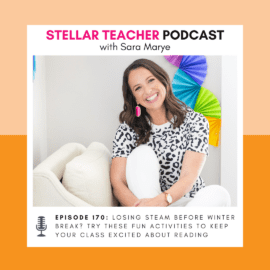
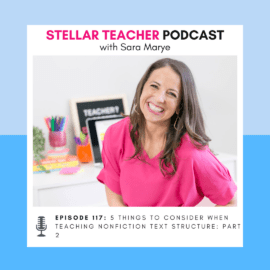
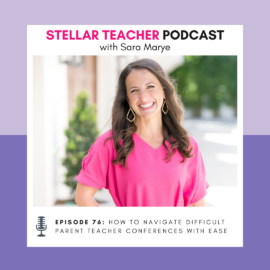
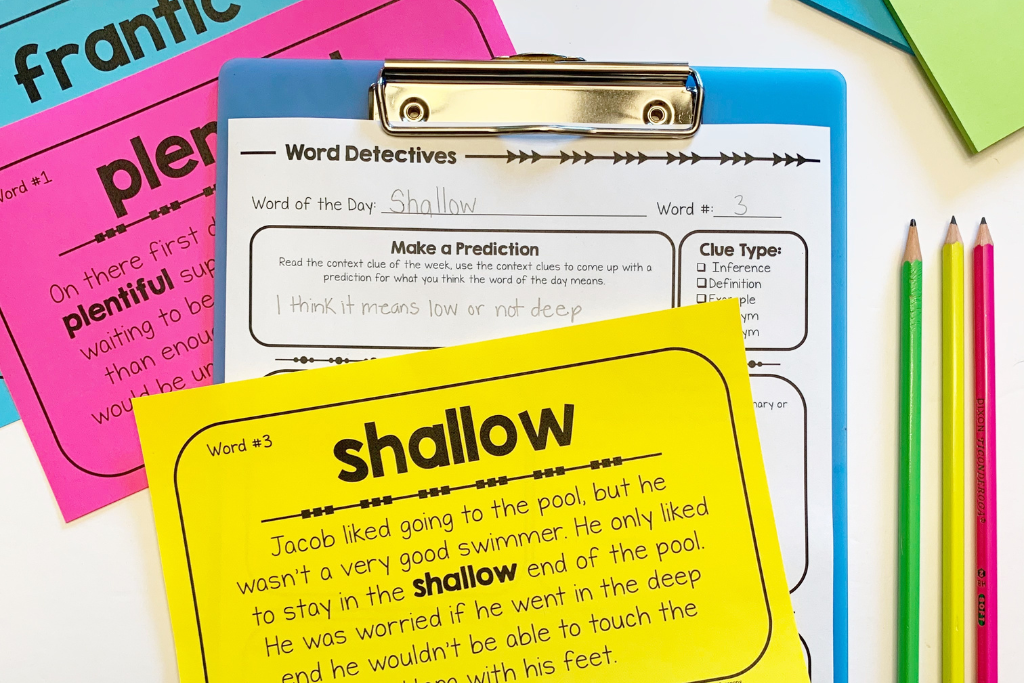

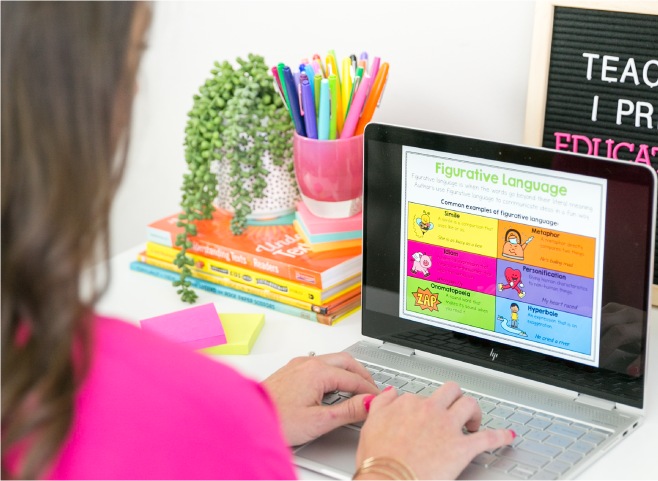
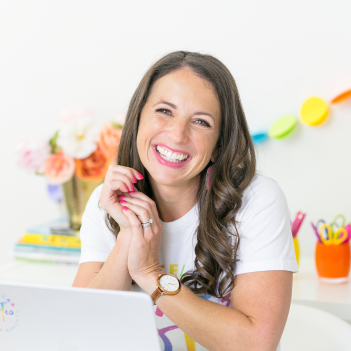
Leave a Comment
You must be logged in to post a comment.